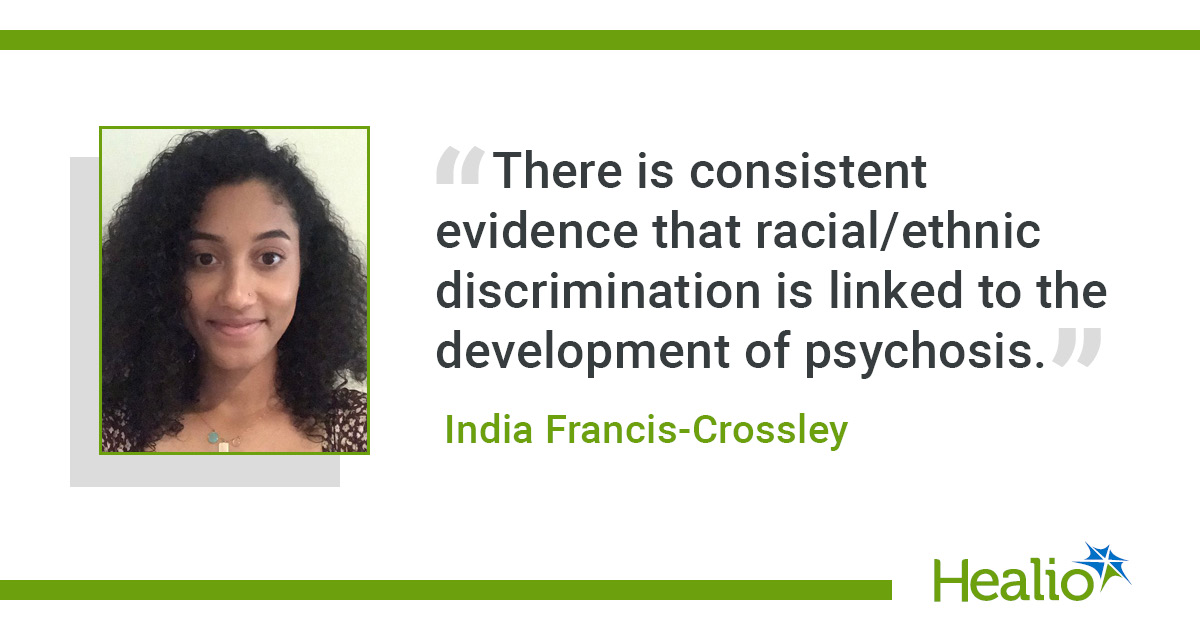October 10, 2025
3 min read
Key takeaways:
- Five reviews found a link between psychosis and racism.
- Higher-quality research is needed to understand the effects of institutional racism and improve scores on a bias and quality checklist.
Racial and ethnic discrimination was associated with a risk for developing psychosis, according to an analysis of systematic reviews published in PLOS Mental Health.
“There is consistent evidence that racial/ethnic discrimination is linked to the development of psychosis,” India Francis-Crossley, PhD student in the division of psychiatry at University College London, told Healio.

These findings add to evidence that racism has a serious impact on health, Francis-Crossley continued, and show the need for more focus on improving and tailoring care for people with psychosis.
“Clinicians should look to integrate antiracism into their practice and think about how racism may be affecting their patients’ lives, considering this when working out how best to support them in their clinical care,” she said.
In an umbrella review, Francis-Crossley and colleagues evaluated the quality of evidence from peer-reviewed journals investigating an association between racial and ethnic discrimination and psychosis.
“The specific studies looking into the association were spread between reviews with different focuses, some wider than just racism and psychosis,” Francis-Crossley said. “This umbrella review enabled us to bring all of this evidence into one place where it could be synthesized.”
The researchers narrowed their search to include seven systematic reviews and meta-analyses, accounting for data from more than 40,300 participants across 23 primary studies from 1999 to 2023.
Across the studies, the types of discrimination reviewed included interpersonal (57%), work/school-related (35%), institutional (22%) and group/vicarious (9%) discrimination, measured with self-reported questionnaires (56%), the Experiences of Discrimination instrument (13%) or unspecified tools (9%).
The studies also measured several psychotic outcomes in clinical (n = 6) and nonclinical samples (n = 17) using 13 psychosis instruments, the most common of which were the Prodromal Questionnaire (26%) and Psychosis Screening Questionnaire (22%).
Overall, five of the reviews reported a positive association between racial and ethnic discrimination and psychosis.
Two meta-analyses reported a direct association between perceived ethnic discrimination and psychotic symptoms. One reached significance even when adjusted for sociodemographic factors (pooled OR = 1.77; 95% CI, 1.26-2.49) or psychotic experiences (pooled OR = 1.94; 95% CI, 1.42-2.67). The second reported a statistically significant correlation (r = 0.21; 95% CI, 0.08-0.33), although this association lost significance in a sensitivity analysis.
More broadly, two other meta-analyses reported a statistically significant correlation between racial and ethnic discrimination and worsened mental health outcomes (r = –0.21; 95% CI, –0.29 to –0.12) or psychiatric symptoms (r = 0.27; 95% CI, 0.2-0.34).
“We noticed more widely when conducting the literature search that many of the reviews or studies that investigated the impact of racism focused mainly on anxiety, depression and psychological well-being and did not include psychosis,” Francis-Crossley noted.
The researchers acknowledged that the most robust evidence was demonstrated in nonclinical populations, with 13 of 16 primary studies showing significantly positive associations. The largest three of these all reported significant associations between racial and ethnic discrimination and psychotic experiences (adjusted OR = 3.13; P < .001).
Francis-Crossley and colleagues also assessed each study for bias and quality using the AMSTAR-2 checklist, finding that most of the reviews rated low (n =2) or critically low (n = 5). Reasons for the poor ratings included lack of prior registration of the review or unsatisfactory methods for investigating potential bias in the primary studies they included.
Overall, the findings support the association between racial/ethnic discrimination and psychosis, although the findings may not be generalizable to countries outside the U.S. and Europe, the researchers wrote. However, they indicated studies with higher quality evidence could explore these associations more in depth.
“Future research into this area should be rigorous and include longitudinal study design in order to investigate the causality and temporality of the relationship between racism and psychosis,” Francis-Crossley said. “More focus also should be paid to the potential mechanisms underlying the association so we can better understand how experiencing racism can be a factor in the development of psychosis.”
For more information:
India Francis-Crossley can be reached at india.francis-crossley.22@ucl.ac.uk.










